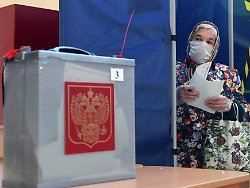With a constitutional change, Vladimir Putin wants to keep the option open to run for the presidency two more times. At the beginning of the referendum, critics call for a boycott.
In the midst of the corona pandemic, the seven-day referendum on a constitutional reform began in Russia, which could keep President Vladimir Putin in power until 2036. According to the current legal situation, the 67-year-old should not start again in 2024 when his current term of office ends. The reform, on the other hand, should allow him to apply for up to two further consecutive six-year terms.
Parliament and the Constitutional Court have already approved the major restructuring of the political system. Parliament and the Constitutional Court have already approved the major restructuring of the political system. The EU is concerned about the possible consequences of the referendum, also because one of the planned changes is to ensure that the Russian constitution always takes precedence over international law and decisions of international courts. According to constitutional experts from the Council of Europe, such a change is not in line with Russia's international commitments, said a spokesman for EU foreign policy chief Josep Borrell. He did not want to comment on the possible extension of the term of office, this decision was a matter for the respective states.
For critics, the plans amount to a constitutional coup. The former KGB agent Putin has been controlling the fortunes of Russia since 1999, either as president or prime minister. The referendum in the largest country in the world is scheduled for July 1st. The original vote in April had been postponed due to the corona pandemic. Special safety precautions are now in place to protect against infection. On the first day of voting, some election workers wore full protective suits, gloves and masks, and there were fever measurements from voters.
Putin's popularity ratings have dropped
According to a survey by the state opinion research institute VTsIOM, around 70 percent of voters are likely to vote for the constitutional change. Putin's popularity ratings are 59 percent, according to demos from the independent Levada Institute. This may be high by international standards, but it is the lowest since Putin since 1999. There is discontent among the population about rising unemployment and falling wages as a result of the slump in the price of oil and restrictions to contain the corona pandemic.
In addition to the fear of electoral fraud and concerns about democratic rights, critics are also concerned about the security of voters in the face of the corona pandemic. With more than 613,000 proven cases of infection, Russia is the third most infected worldwide and thousands are added every day, although the authorities point to a downward trend. The prominent opposition politician Alexej Navalny has therefore called on his supporters to boycott the election. "Voting on the changes is illegal, senseless and dangerous to your health," he said before the referendum started. "You can boycott them. Doing so would be right and honest."
Putin has not ruled out a new candidacy, but also said that he had not yet made a final decision. Opponents of Putin suspect that he wants to cling to power like the Soviet ruler Leonid Brezhnev, who died in office in 1982. Other critics believe that he keeps his options open so that he can possibly hand over the reins to a hand-picked successor. Supported by the state media and without immediate threat from a divided opposition, it is expected that the vote on a large bundle of constitutional changes will be in Putin's sense.
.
